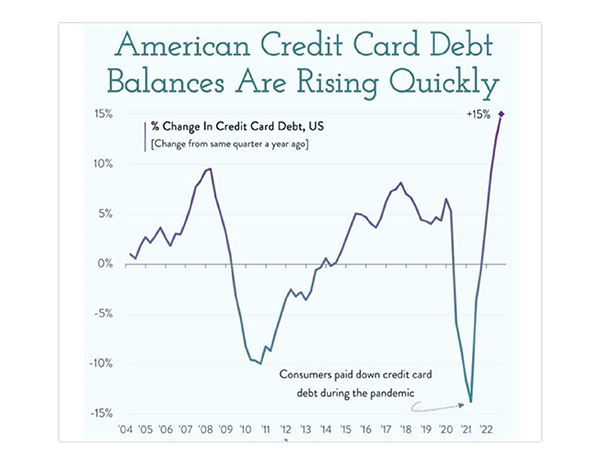Budgets Strained by Crippling Credit Card Debt
Early holiday shopping has reported mixed results, with online shopping reporting growth. The concern is how much buying is being financed on credit cards.
Reports show that consumers are loading up on credit card debt, with total balances far above any level we have seen in the past two decades. As you can see from the graph, consumer spending is on an unsustainable path.
One culprit to the credit card dilemma is the swift increase in mortgage interest rates. With cash-out refinances dramatically slowing due to skyrocketing mortgage rates in the past few months, this is making it more difficult for consumers to have solutions to consolidate high-interest credit card debt.
Let’s hope the next few months provide homeowners with a more cost-effective solution to revolving credit card debt before this problem spirals out of hand.
Mortgage interest rates have maintained their recent improvements, with City Creek’s quoted rate still below 6%. With many homeowners now having rates in the 7.5% range, we are getting to levels where many should now be considering a rate and term refi to reduce their house payments.
We will begin focuing on target costs where people can refinance to lower their rate without increasing their loan balance or paying cash out of pocket. We call this their rate where you can “Refinance and We’ll Pay Your Fees.” If you are, or know someone who is, at a rate above 6.625%, you can respond to this email and ask to be put on our rate watch list.
It’s an important week with many potentially market-moving economic reports scheduled for release. The two we will be closely watching are Thursday’s Personal Consumption Expenditures (PCE) report which is the Fed’s favorite gauge of consumer inflation, and Friday’s Bureau of Labor Statistics report showing the strength of the labor market in the month of November.
Remember that the Fed is hoping to see the pace of new jobs being created slow and the Unemployment Rate move higher. Since employment is always the last to go before a recession, we expect to see the labor market still much stronger than the Fed would like it to be.
With mortgage bonds falling this morning, we recommend locking.



